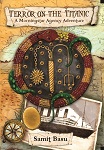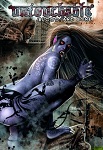 I recently had the pleasure of viewing a collection of photographs by Srikanth Kolari. Srikanth launched our tete-a-tete by declaring that he was not a media-savvy man of words. He hoped his images would speak for themselves and impress viewers with their range of emotions and ideas.
I recently had the pleasure of viewing a collection of photographs by Srikanth Kolari. Srikanth launched our tete-a-tete by declaring that he was not a media-savvy man of words. He hoped his images would speak for themselves and impress viewers with their range of emotions and ideas. His image of the hands of a coal mine worker (see left), like his other photographs, does just that. They show pain, struggle, fear and the grim determination to face another hard day.
Srikanth Kolari’s photographs of life in the burning coalfields of Jharia in Jharkhand, conflict-corners of Kashmir, and the tsunami-hit coast of Tamil Nadu urge viewers to seek out and interpret deeper stories behind each image. He portrays the many shades and shadows of grief, compelling us to confront deep-rooted scars and festering emotional wounds. A major underlying theme of all Srikanth’s projects is the problems faced by humanity. He strives to “focus the spotlight” on poor, marginalised people living on the edge.
Srikanth’s images from coastal Tamil Nadu show the many scars left by tsunami. The care-worn face of Amma Kannu shows stoic forbearance as she stands at the threshold of her dark, empty home. Her husband, a fisherman, was swept away by the sea. His body was never found. She herself was carried all the way to the mangroves and rescued by some villagers. She now lives all alone with her two goats and haunting memories. Today, fishermen continue to brave the waves in flimsy catamarans; tiny specks in the horizon vulnerable to choppy waters and angry grey skies. Even children take makeshift rafts into the mangroves and backwaters in search of fish. They have lost everything; their homes, loved ones, and their boats and fishing nets, the tools of their livelihood. Their memories haunt them and they fear the wrath of the sea. Yet, they have no choice for they must eke out a living. The progress of rehabilitation projects is pathetic. Ruins of slums along Marina beach await fresh construction. Some new houses provided by the local NGO in low lying areas of Kadalur district get flooded after just a few hours of rain. Yet, life goes on. It must. Fishermen and shoppers strike bargains in the daily fish market on Marina beach, Chennai. Dark clouds loom ominously overhead, while the furious sea roars in the backdrop. A crow flies off in a halo of light; a harbinger of hope or warning of disasters. Srikanth leaves it to viewers to make their own interpretations.
Read my complete account in Deccan Herald





